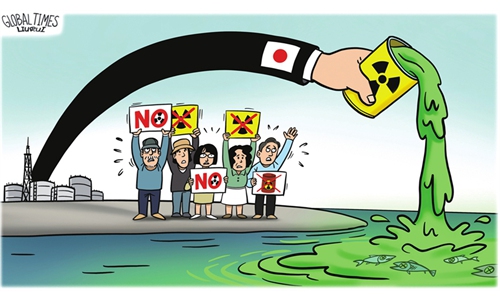China’s environmental authority deploys marine radiation monitoring as Japan plans to dump nuclear-contaminated wastewater into sea
China's Ministry of Ecology and Environment stated on Wednesday that it opposes Japan's plan to dump nuclear-contaminated wastewater from Fukushima into the sea. The ministry said it has deployed environmental monitoring for marine radiation levels and will issue an early warning in time to effectively safeguard the interests of the country and the public health in case of any abnormalities.
The ministry's statement came after the International Atomic Energy Agency (IAEA) released on Tuesday its latest report on Japan's plan to dump the nuclear-contaminated wastewater from the Fukushima Daiichi power plant into the ocean. The IAEA report claimed Japan's plan was "consistent with international safety standards," leading to increased concerns that the IAEA report would be used by the Japanese government to forcefully push through its dumping plan.
The Chinese Foreign Ministry also issued a statement on Tuesday, saying the IAEA report failed to fully reflect the views of experts who participated in the review, and the conclusion was not shared by all experts. The Chinese side expressed regret over the rushed release of the report.
The statement from the Ministry of Ecology and Environment said that Japan's dumping plan still has many problems in terms of its legitimacy, reliability of the purification facility, and the completeness of the monitoring plan.
The Japanese side should face up to the legitimate and reasonable concerns of all parties, earnestly dispose of the nuclear-contaminated water in a scientific, safe and transparent manner, and work with stakeholders including Japan's neighboring countries to put in place as soon as possible a long-term international monitoring mechanism, the ministry said.
In response to rumors claiming that the tritium contained in wastewater discharged from China's nuclear power plant is 6.5 times of that in the nuclear-contaminated wastewater from Fukushima, the ministry said in the statement that we should remain vigilant to the maxim that "the villain complains first" to confuse the public.
The nuclear-contaminated wastewater from the Fukushima nuclear power plant is fundamentally different from liquid discharged from nuclear power plants during regular operations around the world as they originate from different sources and contain different radionuclide. The difficulty of processing this type of wastewater also varies.
We oppose Japan's plan to dump the nuclear-contaminated wastewater into the sea, not the discharge of nuclear power plants during regular operations. Rumors that aim to propagate Japan's dumping plan cannot conceal the truth; and promises cannot hide the results. A well-packaged plan cannot disguise Japan's attempt to transfer harm, and limited selective spot checks cannot replace long-term and impartial international supervision, the statement read.
The ministry also listed some problems concerning Japan's current radiation monitoring, saying that the monitoring process before dumping the nuclear-contaminated wastewater is delayed, making it difficult to verify whether the dumped water is safe in a timely fashion. Moreover, the Japanese side mixed 10 cans of nuclear-contaminated wastewater that were used for monitoring, which may result in the dilution of high-concentration nuclear-contaminated wastewater with low-concentration nuclear-contaminated wastewater, producing qualified nuclear-contaminated wastewater.
Instead of having Japan-manipulated "supervision," there should be a long-term and transparent international supervision system as Japan's dumping plan concerns the global marine environment and public health, the statement noted.
The ministry also said that it has paid close attention to Japan's dumping plan and had organized marine environment monitoring in 2021 and 2022 in China's waters and will issue an early warning if any abnormalities was found.

